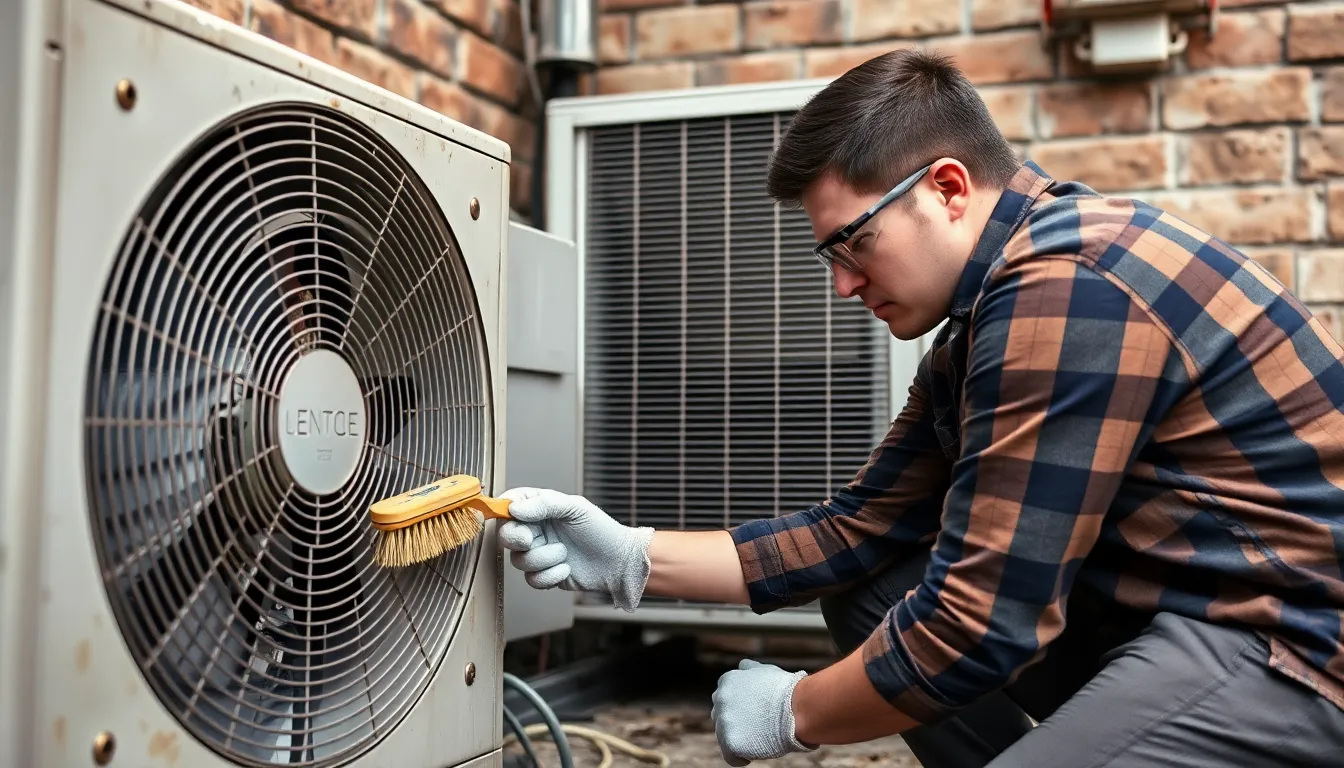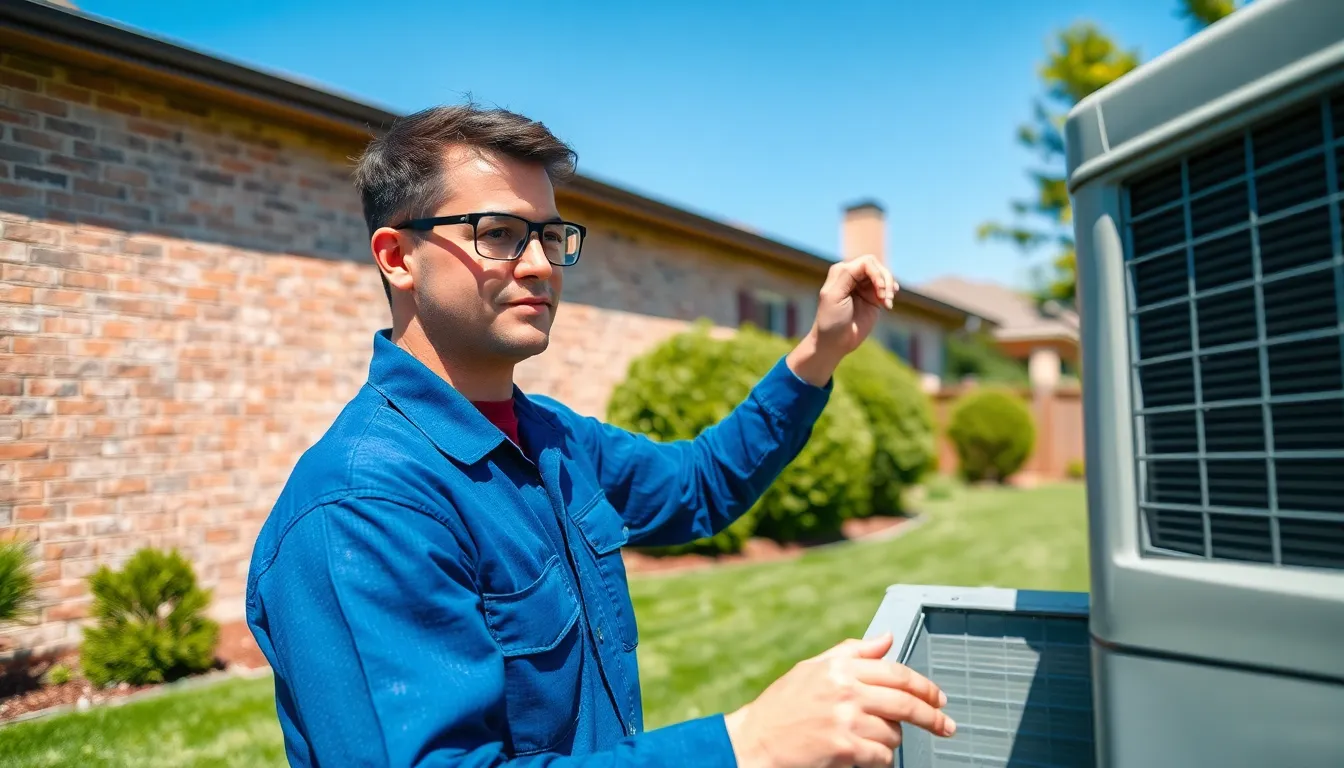Table of Contents
ToggleWhen it comes to home comfort, HVAC systems are the unsung heroes. They keep the temperature just right, ensuring everyone stays cozy in winter and cool in summer. But like a superhero with a hidden weakness, neglecting HVAC upkeep can lead to disastrous consequences. Who wants to be that person sweating through a heatwave or shivering in a snowstorm?
Importance Of HVAC Upkeep
Regular HVAC upkeep ensures optimal performance and comfort in a home. Implementing maintenance routines prevents costly repairs and maintains energy efficiency.
Benefits Of Regular Maintenance
Regular maintenance enhances air quality in homes. It reduces dust accumulation, allergens, and pollutants. Energy efficiency improves significantly, leading to lower utility bills. Systems that receive routine care operate reliably, reducing the risk of unexpected failures. Regular checks also extend equipment lifespan by addressing potential issues before they escalate. Homeowners gain peace of mind, knowing their systems function correctly throughout the year.
Consequences Of Neglecting Upkeep
Neglecting HVAC upkeep can lead to serious issues. Deteriorating performance may result in uneven temperatures and discomfort. Homeowners might experience increased energy expenses as systems work harder to maintain desired temperatures. Breakdowns can occur, often at the worst times, resulting in emergency repairs. Poor air quality can affect health, as dust and allergens circulate in unmaintained systems. Long-term neglect can cause significant financial burdens from costly replacements.
Essential HVAC Upkeep Tasks

Routine upkeep tasks ensure HVAC systems operate efficiently and effectively. Maintenance fosters comfort and supports energy savings, protecting investments over time.
Filter Replacement
Regularly replacing filters is crucial for maintaining indoor air quality. Clogged filters restrict airflow, making systems work harder and consume more energy. Experts recommend changing filters every 1 to 3 months based on usage and filter type. Homeowners can benefit from improved airflow and energy efficiency with fresh filters. Additionally, effective filter replacement minimizes dust, allergens, and pollutants.
Cleaning Coils
Cleaning coils enhances energy efficiency and system longevity. Dirty coils force HVAC systems to exert more energy, leading to increased utility bills. Coils should be cleaned annually, with emphasis on both evaporator and condenser coils. Homeowners can take action by utilizing a soft brush or a vacuum with a brush attachment. Cleaning keeps coils free of dirt and debris, optimizing performance and cooling capability. Maintaining cleanliness produces cooler indoor temperatures, supporting overall comfort.
Checking Refrigerant Levels
Checking refrigerant levels is important for proper system operation. Inadequate refrigerant can lead to poor cooling performance, raising energy costs. Technicians advise evaluating levels annually during maintenance. If levels are low, a leak detection and repair process must occur. Homeowners should be aware that correct refrigerant levels ensure efficient cooling and heating cycles. Routine checks also help prevent system damage, contributing to extended equipment lifespan.
Seasonal HVAC Upkeep Tips
Seasonal maintenance ensures HVAC systems operate efficiently year-round. Spring and fall checklists focus on crucial tasks that enhance performance.
Spring Maintenance Checklist
Homeowners should replace filters to improve indoor air quality and system efficiency. Cleaning coils promotes better heat exchange, which reduces energy costs. Checking refrigerant levels prevents operational issues as the weather warms. Inspecting the thermostat ensures accurate temperature settings, enhancing comfort. Assessing drainage systems helps prevent water damage and mold growth. Spring maintenance lays the groundwork for an efficient cooling season.
Fall Maintenance Checklist
Replacing filters remains essential to maintain air quality as dust levels increase. Cleaning outdoor units prevents blockages from debris, ensuring efficient airflow. A thorough check of the heating components guarantees effective heating throughout winter. Inspections of ductwork identify leaks that may waste energy. Testing the thermostat for accuracy prepares systems for the demanding heating season. Fall maintenance optimizes HVAC performance and enhances home comfort during colder months.
Professional vs. DIY HVAC Upkeep
Understanding when to call a professional versus when to tackle maintenance tasks personally helps ensure efficient HVAC operation and longevity.
When To Call A Professional
Calling a professional becomes essential when dealing with complex issues beyond basic upkeep. If an HVAC system experiences unusual noises, inconsistent temperatures, or requires refrigerant recharging, expert intervention is crucial. Professionals possess the training and tools to diagnose and fix problems effectively. Any signs of leaks or malfunctioning components indicate it’s time for a technician. Additionally, homeowners should consider scheduling annual inspections to prevent minor issues from escalating into major repairs.
DIY Maintenance Tips
DIY maintenance tasks empower homeowners to enhance HVAC performance with minimal effort. Changing filters regularly ranks as a top priority, typically every 1 to 3 months, to optimize air quality. Cleaning coils ensures efficient operation and savings on energy bills. Checking and clearing the drainage system prevents water buildup, reducing the risk of mold growth. Inspecting ductwork for visible leaks ensures consistent heating and cooling throughout the home. Homeowners should also familiarize themselves with thermostat settings to maximize system efficiency.
Proper HVAC upkeep is essential for maintaining a comfortable and healthy living environment. By committing to regular maintenance tasks homeowners can avoid costly repairs and ensure their systems operate efficiently throughout the year. Seasonal checklists and proactive measures empower individuals to take control of their HVAC performance while enhancing air quality and reducing energy costs.
Understanding when to seek professional help is equally important. Complex issues should be addressed by trained technicians to prevent further complications. With a balanced approach to DIY maintenance and professional support homeowners can enjoy reliable HVAC systems that provide peace of mind and comfort in every season.







